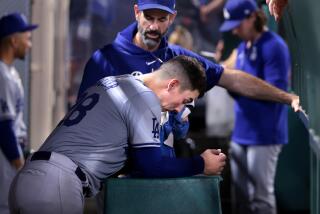Free and Kindred Spirits
NEWARK, N.J. â Julie Miller sits down in a food court at Newark Airport while her musical and marital partner, Buddy Miller, checks them into their flight to Nashville. Minutes earlier, Buddy had to stand firm to fend off a $300 overcharge on the rental car theyâd used for a series of East Coast dates that had ended the night before at the Bottom Line in New York.
âDriving ourselves around was thrilling at 20,â says Julie, a 43-year-old whoâs quick with a laugh. âBut at this stage, âLetâs go home.â â
The Millers might be the hippest musical couple in Nashville, but that doesnât count for much in a company town that regards a tour bus as standard equipment. Instead, the Millers are stars of the alternative-country world. They help each other record individual solo records in their home studio for the independent HighTone label, place the occasional song on somebody elseâs mainstream album and work with such other free spirits as Emmylou Harris, Steve Earle and Jim Lauderdale.
Buddy and Julie Miller make for an oddly cohesive musical couple. Julieâs a singer-songwriter with a taste for rock, a poetic lyrical gift and a voice that blends girlish innocence with hard-won wisdom. Buddy, 47, is an ace guitar player, a rootsy producer and a honky-tonk singer with a taste for soul music.
Itâs the tangy blend of their vocal harmonies that connects their quite different but equally well-received 1999 albums, Julieâs âBroken Thingsâ and Buddyâs âCruel Moon.â The annual Village Voice poll of U.S. critics confirmed this puzzling synchronicity: âCruel Moonâ came in at No. 49, while âBroken Thingsâ ranked 51.
The Millersâ critical renown has been on the rise since the 1995 release of Buddyâs first album, âYour Love and Other Lies,â which Earle called âthe country record of the decade.â On the strength of Julieâs singing and songwriting on that record, HighTone signed her and released âBlue Ponyâ in 1997. (During the early â90s, Julie, with the help of Buddy, released four albums to the Christian market.)
âBroken Things,â a tune first recorded for one of her Christian albums, contains the sort of romantic and spiritual ambiguity found in songs by the likes of Hank Williams, Sam Cooke and Al Green. âYou can have my heart,â starts the second verse, âif you donât mind broken things. . . . Well I heard that you make old things new, so I give these pieces all to you. If you want it you can have my heart.â
âWhen you talk about emotional things,â says Julie, who neither flaunts nor hides her faith, âmost people can relate to it. In a way, the strictly Christian audience, which is mostly younger, related less to my songs than the honky-tonk audience. But Iâve always had a problem with either group of people putting the other group in a box. I just feel like Iâve got to be myself wherever I am.â
Mission accomplished. At the Bottom Line, Julie looked at her fingers when she changed guitar chords, and her occasionally serious stage patter took funny, Gracie Allen-like turns. Buddyâs the consummate musician and far more reserved.
âI used to really try to focus on the process of writing a song,â says Julie, âbut then I realized that my songs come from a place thatâs not really about thinking. I have to go off into a sort of underwater trance to write a song. And I have to keep a tape recorder running, because I forget everything instantly.â
Thatâs where Buddy comes in, to help flesh out the sound. âA lot of songwriters use a drum machine while theyâre writing,â he says. âIâm Julieâs human beat box, the happy strummer who must never tire.â
Julieâs albums are filled with solo copyrights. Buddyâs songs are mostly co-written with Julie (who keeps a separate notebook of country-like âBuddyâ lyrics) or Lauderdale, a successful Nashville songwriter and another talented performer without a bus whose resume includes 10 songs recorded by George Strait.
Buddy Millerâs writing time is limited by his second career as a guitarist and record producer. He spent three weeks co-producing Jimmie Dale Gilmoreâs critically lauded âOne Endless Night.â
Buddyâs also the lead guitarist in Emmylou Harrisâ Spyboy band; he co-produced that groupâs live album and is playing on Harrisâ next studio record. Harris, who recorded Julieâs âAll My Tearsâ on âWrecking Ball,â has made guest appearances on all the Millersâ albums.
âWhen I was planning to take âWrecking Ballâ on the road,â says Harris, âI immediately thought of Buddy because he can create that atmospheric sound and play more traditional styles with equal empathy. Heâs also a great singer. When he and Julie sing, they have a blend that creates that wonderful third voice.â
Steve Earle also contributes to the Millersâ albums and gave Buddy an unreleased song (âIâm Not Getting Any Better at Goodbyeâ) for âCruel Moon.â After hearing Buddy with Spyboy, Earle hired him to play lead guitar on his âEl Corazonâ tour. While on the road with Harris and Earle, Buddy got to do double duty, opening the show with Julie, and playing lead guitar with the headliner.
The Millers have always run in interesting circles. Julie met Buddy in the mid-â70s in Austin, where she had lived since age 7 after her family moved from a small Texas town. She was the âchick singerâ in a band when Buddy--a native of Ohio whose path to Austin had begun in upstate New York and passed through New Jersey, San Francisco, Seattle and New York--auditioned to play guitar.
Late in the decade, they became a romantic couple and moved to Manhattan, where the Buddy Miller Band included Larry Campbell, who currently plays guitar in Bob Dylanâs band. Over the next two years, the group started to attract the attention of major labels.
Thatâs when Julie, whoâd had her battles with depression, dropped a bombshell.
âBuddy and the band were at the bar that we were playing,â says Julie, âand they were wondering where Iâd gone, and I called him at the bar and said, âBuddy, youâre not going to believe this, but Iâve just met some Christians and Iâve given my life to Jesus and I canât come back.â â
Buddy was stunned. The bandleader called Austin to recruit an old pal--Shawn Colvin--to join the band. Then the abandoned lover started reading Julieâs old Bible, which had been used to hold up a leg of their couch. Two months later he followed her to Texas, where the Jewish musician converted to Christianity. They were married in 1983.
âI was really sad when Buddy moved,â says Lauderdale, who barely knew Julie when he used to sit in with the Buddy Miller Band, âbut I also really admired him and thought it was a great love story.â *
More to Read
The biggest entertainment stories
Get our big stories about Hollywood, film, television, music, arts, culture and more right in your inbox as soon as they publish.
You may occasionally receive promotional content from the Los Angeles Times.










